Why hearing is important
Consider all the sounds that surround you every single day: a child laughing,
a bird singing, a friend chatting, or a great song on the radio - it is this
symphony of sounds that makes life richer.
Hearing empowers us and helps us lead our everyday lives without
limitations. It enables us to socialize, work and communicate. It also helps us
to stay connected to the outside world and it keeps us safe by warning us of
potential danger. A telephone ringing, a restless baby or the blare of a fire
alarm is just a few examples of important signals that we need to be able to
hear.
Consider all the sounds that surround you every single day: a child laughing, a bird singing, a friend chatting, or a great song on the radio - it is this symphony of sounds that makes life richer.
Hearing empowers us and helps us lead our everyday lives without limitations. It enables us to socialize, work and communicate. It also helps us to stay connected to the outside world and it keeps us safe by warning us of potential danger. A telephone ringing, a restless baby or the blare of a fire alarm is just a few examples of important signals that we need to be able to hear.


Living with hearing loss
Hearing is an easy thing to take for granted. Occasionally we might miss a
few words, but in general we move around effortlessly in everyday life,
talking to one another, chatting over the phone or listening to the TV, without
paying it a second thought.
Things are not nearly as easy with a hearing loss. When hearing loss occurs,
a simple thing like following a conversation in a restaurant or hearing the
doorbell or telephone can become a real issue. You may start to experience
all sorts of emotions – from worry to sadness and loneliness. You may also
feel tired and irritable from having to concentrate just to hear what people are
saying. Left unattended, hearing loss can ultimately lead to feelings of
isolation and depression.
Hearing is an easy thing to take for granted. Occasionally we might miss a few words, but in general we move around effortlessly in everyday life, talking to one another, chatting over the phone or listening to the TV, without paying it a second thought.
Things are not nearly as easy with a hearing loss. When hearing loss occurs, a simple thing like following a conversation in a restaurant or hearing the doorbell or telephone can become a real issue. You may start to experience all sorts of emotions – from worry to sadness and loneliness. You may also feel tired and irritable from having to concentrate just to hear what people are saying. Left unattended, hearing loss can ultimately lead to feelings of isolation and depression.
Recognize the signs
Happily, things do not have to stay that way. Thanks to the latest technology,
there are many products out there that can help you to overcome the
difficulties of hearing loss. That’s why it’s important to recognize the signs
and symptoms as early as possible, so that a hearing loss doesn’t limit your
social life.
What hearing loss sound like
We can't hear what other people hear, so it’s usually hard to explain how
hearing loss changes our perception of sound. Listen to an example to get
an idea of how hearing loss affects the ability to distinguish speech.
Happily, things do not have to stay that way. Thanks to the latest technology, there are many products out there that can help you to overcome the difficulties of hearing loss. That’s why it’s important to recognize the signs and symptoms as early as possible, so that a hearing loss doesn’t limit your social life.
What hearing loss sound like
We can't hear what other people hear, so it’s usually hard to explain how hearing loss changes our perception of sound. Listen to an example to get an idea of how hearing loss affects the ability to distinguish speech.

SIGNS AND SYMPTOMS
Signs of hearing loss
Today, nearly one in two people over the age of 50 have difficulty understanding what people say in
busy environments. If any of the typical signs below seems to apply to you, you should contact a
hearing care professional for a consultation. People get their teeth and eyes checked a regularly, so
why not check your ears too? These are the typical signs and symptoms:
Today, nearly one in two people over the age of 50 have difficulty understanding what people say in busy environments. If any of the typical signs below seems to apply to you, you should contact a hearing care professional for a consultation. People get their teeth and eyes checked a regularly, so why not check your ears too? These are the typical signs and symptoms:

At work
Do you find yourself straining to keep up with conversations in a busy office surrounding?

At social occasions
Do you feel that people are mumbling and sometimes need to ask them to say things twice?

By the TV
Do you turn up the volume on the TV or radio louder than others in the room prefer?

On the telephone
Is it hard to hear the person on the other line and do you need to ask them to speak up?

At home
Do friends and relatives often complain that no one answers the door or their phone calls?

Outdoors
Do you have difficulty hearing sounds of nature, such as birds singing or rain falling?
THE NATURE OF HEARING LOSS
How hearing loss works
As our hearing usually changes slowly over the years, a hearing loss can be
quite difficult to recognize. While some sounds might still be easy to hear,
other can become increasingly hard to make out. Knowing more about what
to be aware of will help you monitor your own reactions: If you find yourself
saying “What did you say?” or “Sorry, could you say that again?” you will
know that it is time to take action.
The ear vs. the eye
As with the eye, the ear’s performance is affected by ageing. But that’s
where the similarities end. When you look at an eye chart, the letters will
gradually become harder to distinguish as they get smaller. When you
experience hearing loss, certain syllables are typically harder to hear than
others.
The softer, high pitched consonants such as ‘f’, ‘s’ or ‘t’ can be drowned out
by the louder, low-pitched vowel sounds – such as ‘a’, ‘o’ and ‘u’. So if
someone says “statue” and all you can hear is “s_a_ue”, you will be forced to
try and guess the rest – by which time the conversation might have moved
on.
As our hearing usually changes slowly over the years, a hearing loss can be quite difficult to recognize. While some sounds might still be easy to hear, other can become increasingly hard to make out. Knowing more about what to be aware of will help you monitor your own reactions: If you find yourself saying “What did you say?” or “Sorry, could you say that again?” you will know that it is time to take action.
The ear vs. the eye
As with the eye, the ear’s performance is affected by ageing. But that’s where the similarities end. When you look at an eye chart, the letters will gradually become harder to distinguish as they get smaller. When you experience hearing loss, certain syllables are typically harder to hear than others.
The softer, high pitched consonants such as ‘f’, ‘s’ or ‘t’ can be drowned out by the louder, low-pitched vowel sounds – such as ‘a’, ‘o’ and ‘u’. So if someone says “statue” and all you can hear is “s_a_ue”, you will be forced to try and guess the rest – by which time the conversation might have moved on.
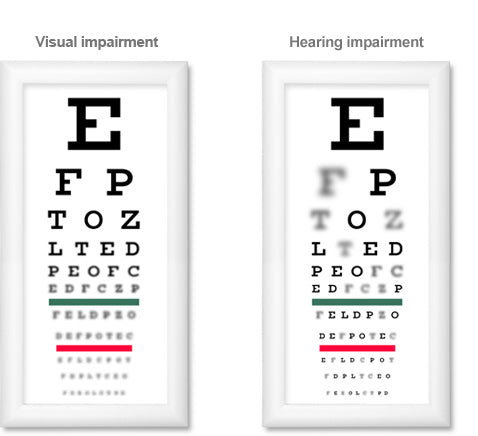

Causes of hearing loss
Hearing loss is often associated with advancing age, but this is not always
the case. Although it can strike people at any age, the condition most often
appears after the age of 50.
The brief descriptions below will give you an idea of the different types of
hearing loss and what causes them. For more information, please contact
your local hearing clinic.
Hearing loss is often associated with advancing age, but this is not always the case. Although it can strike people at any age, the condition most often appears after the age of 50.
The brief descriptions below will give you an idea of the different types of hearing loss and what causes them. For more information, please contact your local hearing clinic.
Age-related hearing loss
As we get older, some of us lose our ability to hear softer, high-pitched
sounds. Birdsong, footsteps and leaves rustling in the wind is fairly easy to
live without, but if you lose some of the building blocks of speech or the
ability to hear important warning signals in your home, it is far more serious.
Hearing loss may creep up slowly, but eventually it will affect your ability to
live a rich and active life.
Noise-induced hearing loss
Noise-induced hearing loss is caused by overexposure to excessive sound
levels. All over the world, people are encountering increasingly more sound.
Even relatively low sound levels can actually damage your hearing if you are
exposed to it on a daily basis. It threatens the hearing of many people in our
society – from police officers, construction workers and farmers to teachers,
dentists and restaurant workers. Follow the link below to get some tips on
how you can protect your hearing.
As we get older, some of us lose our ability to hear softer, high-pitched sounds. Birdsong, footsteps and leaves rustling in the wind is fairly easy to live without, but if you lose some of the building blocks of speech or the ability to hear important warning signals in your home, it is far more serious. Hearing loss may creep up slowly, but eventually it will affect your ability to live a rich and active life.
Noise-induced hearing loss
Noise-induced hearing loss is caused by overexposure to excessive sound levels. All over the world, people are encountering increasingly more sound. Even relatively low sound levels can actually damage your hearing if you are exposed to it on a daily basis. It threatens the hearing of many people in our society – from police officers, construction workers and farmers to teachers, dentists and restaurant workers. Follow the link below to get some tips on how you can protect your hearing.

TYPES OF HEARING LOSS
A delicate system
The human ear is a precisely tuned system with a sensitivity and range that
easily outperforms the most advanced hi-fi systems ever built. The ear
consists of many delicate mechanisms, and a disruption in any of these can
result in hearing loss.
In general, there are two main types of hearing loss – conductive and
sensorineural. It is also possible to have a mixed hearing loss that is a
combination of both.
The human ear is a precisely tuned system with a sensitivity and range that easily outperforms the most advanced hi-fi systems ever built. The ear consists of many delicate mechanisms, and a disruption in any of these can result in hearing loss.
In general, there are two main types of hearing loss – conductive and sensorineural. It is also possible to have a mixed hearing loss that is a combination of both.
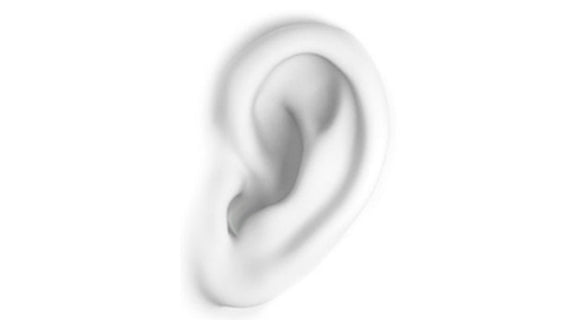
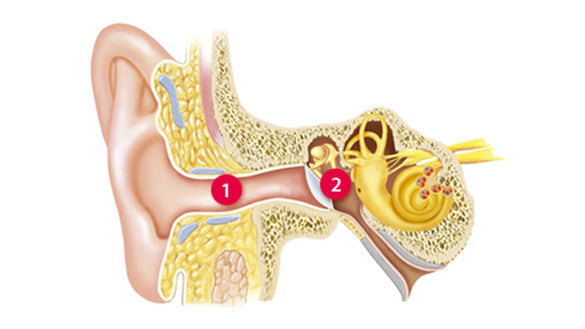
Conductive hearing loss
Conductive hearing loss is the result of sounds not being able to get through
to the inner ear. This is caused by problems in the outer (1) and middle ear
(2).
The most common cause can be a build-up of wax in the ear canal, fluid in
the middle ear, perforated eardrums, or damaged middle ear bones. The
result of this type of hearing loss is that sounds become quieter, although not
usually distorted. Conductive hearing losses can often be treated medically.
Conductive hearing loss is the result of sounds not being able to get through to the inner ear. This is caused by problems in the outer (1) and middle ear (2).
The most common cause can be a build-up of wax in the ear canal, fluid in the middle ear, perforated eardrums, or damaged middle ear bones. The result of this type of hearing loss is that sounds become quieter, although not usually distorted. Conductive hearing losses can often be treated medically.
Sensorineural hearing loss
This type of hearing loss happens when the delicate sensory cells or nerve
fibres in the inner ear (3) get damaged. This stops them from transmitting
sound properly. The most common causes are the natural process of ageing
or excessive exposure to noise.
This type of hearing loss not only changes our ability to hear quiet sounds,
but it also reduces the quality of the sound that is being heard, making it
especially difficult to understand speech. Once these hair cells are damaged,
they will remain so permanently. Therefore sensorineural hearing loss cannot
be cured – at least not at the present time.
This type of hearing loss happens when the delicate sensory cells or nerve fibres in the inner ear (3) get damaged. This stops them from transmitting sound properly. The most common causes are the natural process of ageing or excessive exposure to noise.
This type of hearing loss not only changes our ability to hear quiet sounds, but it also reduces the quality of the sound that is being heard, making it especially difficult to understand speech. Once these hair cells are damaged, they will remain so permanently. Therefore sensorineural hearing loss cannot be cured – at least not at the present time.
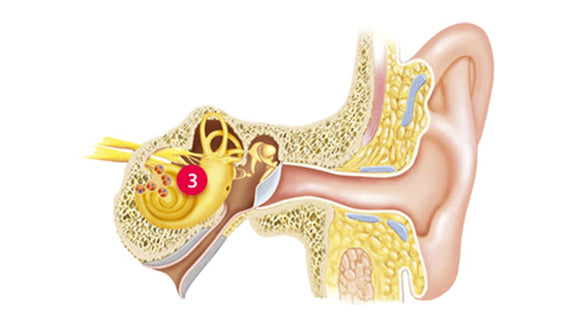
WAYS TO BETTER HEARING
Don’t let hearing loss hold you back
Recent studies show that hearing loss is becoming more common in modern
society. In fact, one in two adults over the age of 50 experience some kind of
hearing loss. Living with a hearing loss these days is however nothing like it
used to be.
Thanks to modern technology, there are many products out there that can
help you to overcome the difficulties of hearing loss. While some will help
you to hear more clearly, others will help to keep you safe and connected to
the outside world.
In this section you can learn more about what’s available.
Recent studies show that hearing loss is becoming more common in modern society. In fact, one in two adults over the age of 50 experience some kind of hearing loss. Living with a hearing loss these days is however nothing like it used to be.
Thanks to modern technology, there are many products out there that can help you to overcome the difficulties of hearing loss. While some will help you to hear more clearly, others will help to keep you safe and connected to the outside world.
In this section you can learn more about what’s available.

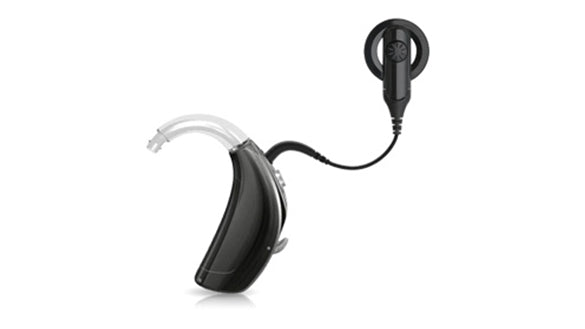
Hearing aids
A hearing aid or cochlear implant is a fantastic invention for people with
hearing loss. The modern hearing aids of today are nothing like the old beige
bananas; they are small, sleek and effective. Although a hearing aid can
never totally restore your hearing, it can usually restore your ability to
communicate, which will improve the quality of life not only for you but also
for the rest of the family.
A hearing aid needs to be fitted by a professional and usually takes some
time to adjust to. The first step is to a visit your local hearing care
professional for a hearing test.
A hearing aid or cochlear implant is a fantastic invention for people with hearing loss. The modern hearing aids of today are nothing like the old beige bananas; they are small, sleek and effective. Although a hearing aid can never totally restore your hearing, it can usually restore your ability to communicate, which will improve the quality of life not only for you but also for the rest of the family.
A hearing aid needs to be fitted by a professional and usually takes some time to adjust to. The first step is to a visit your local hearing care professional for a hearing test.
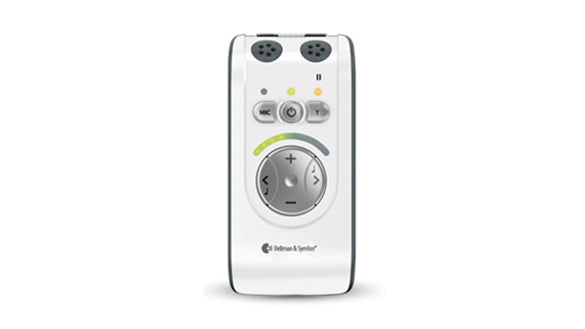
Personal amplifiers
A personal amplifier can be used as a complement or as an alternative to a
hearing aid. A personal amplifier is less expensive, works out-of-the-box, and
is often easier to handle for people with low vision or limited dexterity.
A personal amplifier looks approximately like a TV-remote and can be used
for instance with regular headphones. Place it on the table in front of you or
point it to the person talking to hear the conversation around you.
A personal amplifier can be used as a complement or as an alternative to a hearing aid. A personal amplifier is less expensive, works out-of-the-box, and is often easier to handle for people with low vision or limited dexterity.
A personal amplifier looks approximately like a TV-remote and can be used for instance with regular headphones. Place it on the table in front of you or point it to the person talking to hear the conversation around you.
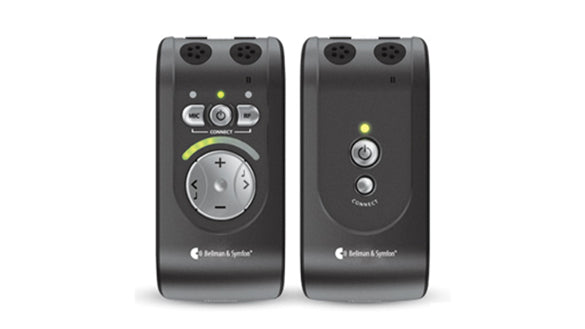
Listening systems
Even with a modern hearing aid, there are still some situations where a
hearing aid just isn’t effective enough. Like for instance when you are out
dining on a noisy restaurant or participating on a crowded meeting or
seminar. In these situations, a wireless listening system is a good
complement to a hearing aid. It reduces the distance to the person talking
and clarifies speech even further before it reaches your hearing aid.
A listening system consists of a receiver that captures speech close to you,
and a transmitter that picks up speech from further away.
Even with a modern hearing aid, there are still some situations where a hearing aid just isn’t effective enough. Like for instance when you are out dining on a noisy restaurant or participating on a crowded meeting or seminar. In these situations, a wireless listening system is a good complement to a hearing aid. It reduces the distance to the person talking and clarifies speech even further before it reaches your hearing aid.
A listening system consists of a receiver that captures speech close to you, and a transmitter that picks up speech from further away.
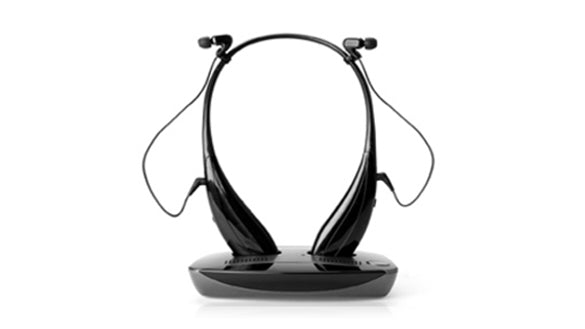
TV listeners
A TV listener enables you to hear the television, radio or stereo more clearly
without making it too loud for other people in the room. You can choose
models with neckloop if you wear a hearing aid or stethoset versions if you
don’t.
Most TV listeners are cordless so you can walk around the room without
having to take them off. A personal amplifier or a wireless listening system
can also be used as a TV listener.
A TV listener enables you to hear the television, radio or stereo more clearly without making it too loud for other people in the room. You can choose models with neckloop if you wear a hearing aid or stethoset versions if you don’t.
Most TV listeners are cordless so you can walk around the room without having to take them off. A personal amplifier or a wireless listening system can also be used as a TV listener.

Notification systems
A notification system will alert you to signals in your home, like for instance
when the doorbell or telephone rings, when your baby needs you or if the
smoke alarm is activated. It notifies you with a combination of sound,
vibrations and flashing lights and works even if you are several rooms away
from the signal.
The alerting system consists of a number of transmitters that are wirelessly
connected to a receiver. The receiver can be placed on a table, worn on the
belt, or even around the wrist like a normal wrist watch.
A notification system will alert you to signals in your home, like for instance when the doorbell or telephone rings, when your baby needs you or if the smoke alarm is activated. It notifies you with a combination of sound, vibrations and flashing lights and works even if you are several rooms away from the signal.
The alerting system consists of a number of transmitters that are wirelessly connected to a receiver. The receiver can be placed on a table, worn on the belt, or even around the wrist like a normal wrist watch.
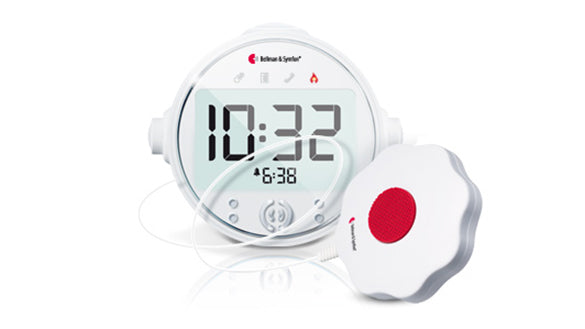
Amplified alarm clocks
An amplified alarm clock with extra loud sounding alarm and a bed shaker
that vibrates under the pillow or mattress is specially designed to wake up
and alert people with hearing loss, or those who are just deep sleepers.
Some alarm clocks are even connected to a wireless notification system so
that for instance, if a fire starts during your sleep, the alarm clock will
immediately awake you. An inexpensive insurance that will provide both you
and your family with a good night’s sleep.
An amplified alarm clock with extra loud sounding alarm and a bed shaker that vibrates under the pillow or mattress is specially designed to wake up and alert people with hearing loss, or those who are just deep sleepers.
Some alarm clocks are even connected to a wireless notification system so that for instance, if a fire starts during your sleep, the alarm clock will immediately awake you. An inexpensive insurance that will provide both you and your family with a good night’s sleep.
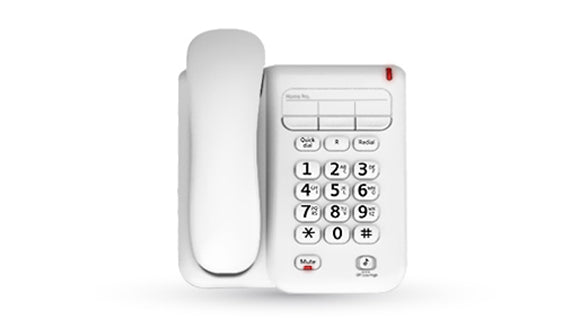
Amplified telephones
An amplified telephone or mobile phone can help you to hear and
communicate more clearly on the phone. Amplified phones make the sound
louder, so that it is easier to hear the other person speaking. Some models
also make your voice louder for the person on the other end of the line.
There are both chorded and cordless models as well as mobile phones
available. If you prefer your old telephone you can connect an external
telephone amplifier to increase the volume.
An amplified telephone or mobile phone can help you to hear and communicate more clearly on the phone. Amplified phones make the sound louder, so that it is easier to hear the other person speaking. Some models also make your voice louder for the person on the other end of the line.
There are both chorded and cordless models as well as mobile phones available. If you prefer your old telephone you can connect an external telephone amplifier to increase the volume.
